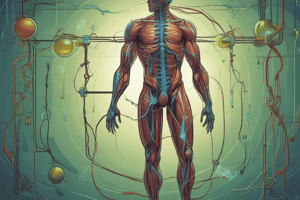Podcast
Questions and Answers
What is the main function of body water?
What is the main function of body water?
- Acts as a site for energy production
- Forms the structural framework of the body
- Facilitates hormone secretion
- Constitutes the medium for solute dissolution and metabolic reactions (correct)
Where is the average water content of the human body distributed?
Where is the average water content of the human body distributed?
- Extracellular fluid only
- Intravascular extracellular fluid and intracellular fluid
- Intracellular fluid only
- Intravascular extracellular fluid and interstitial cell fluid (correct)
What does osmolality measure in a solution?
What does osmolality measure in a solution?
- Pressure exerted by solutes on the solvent
- Volume of solutes per liter of solvent
- Mass of solutes per unit volume of solvent
- Concentration of solutes per kilogram of solvent (correct)
What is the response to increased blood osmolality?
What is the response to increased blood osmolality?
What occurs in dehydration with pure water loss or deficit?
What occurs in dehydration with pure water loss or deficit?
Which of the following best describes the distribution of water in the human body?
Which of the following best describes the distribution of water in the human body?
What is the response of the hypothalamus to changes in blood osmolality?
What is the response of the hypothalamus to changes in blood osmolality?
What is the main effect of dehydration with pure water loss or deficit?
What is the main effect of dehydration with pure water loss or deficit?
What is the parameter to which the hypothalamus responds in relation to blood osmolality?
What is the parameter to which the hypothalamus responds in relation to blood osmolality?
In response to increased blood osmolality, what is the main function of aldosterone?
In response to increased blood osmolality, what is the main function of aldosterone?
What is the normal plasma water content as a percentage of the total plasma composition?
What is the normal plasma water content as a percentage of the total plasma composition?
In response to changes in blood osmolality, which hormone is responsible for promoting the retention of sodium and excretion of potassium?
In response to changes in blood osmolality, which hormone is responsible for promoting the retention of sodium and excretion of potassium?
What is the main effect of pure water loss or deficit in dehydration?
What is the main effect of pure water loss or deficit in dehydration?
What physical property of a solution is based on the concentration of solutes per kilogram of solvent?
What physical property of a solution is based on the concentration of solutes per kilogram of solvent?
How does the hypothalamus respond to changes in blood osmolality?
How does the hypothalamus respond to changes in blood osmolality?
Flashcards
Body water function
Body water function
Medium for solute dissolution and metabolic reactions
Water distribution
Water distribution
Intravascular, extracellular, and interstitial fluid compartments.
Osmolality measurement
Osmolality measurement
Concentration of solutes per kilogram of solvent.
Increased blood osmolality response
Increased blood osmolality response
Signup and view all the flashcards
Dehydration (pure water loss)
Dehydration (pure water loss)
Signup and view all the flashcards
Body water distribution (ratio)
Body water distribution (ratio)
Signup and view all the flashcards
Hypothalamus response to osmolality
Hypothalamus response to osmolality
Signup and view all the flashcards
Dehydration effect (pure water loss)
Dehydration effect (pure water loss)
Signup and view all the flashcards
Osmolality
Osmolality
Signup and view all the flashcards
Aldosterone's role in osmolality changes
Aldosterone's role in osmolality changes
Signup and view all the flashcards
Plasma water content
Plasma water content
Signup and view all the flashcards
Hormone for sodium and potassium
Hormone for sodium and potassium
Signup and view all the flashcards
Dehydration (pure water deficit)
Dehydration (pure water deficit)
Signup and view all the flashcards
Osmolality in solution
Osmolality in solution
Signup and view all the flashcards
Hypothalamus reaction to blood osmolarity
Hypothalamus reaction to blood osmolarity
Signup and view all the flashcards
Study Notes
Body Water and Osmolality
- The main function of body water is to regulate various bodily functions, including temperature, metabolism, and cellular processes.
Distribution of Body Water
- The average water content of the human body is distributed as follows:
- 55-60% of body weight is water, with 40% being intracellular fluid and 20% being extracellular fluid.
- 28% of the total body water is found in blood plasma.
Osmolality
- Osmolality measures the concentration of solutes in a solution, specifically the number of osmoles of solute per kilogram of solvent.
Response to Changes in Blood Osmolality
- When blood osmolality increases, the hypothalamus responds by stimulating thirst and increasing the production of antidiuretic hormone (ADH) to conserve water.
- The response to increased blood osmolality also involves the release of aldosterone, which promotes the retention of sodium and excretion of potassium.
Dehydration
- In dehydration with pure water loss or deficit, the main effect is a decrease in blood volume, leading to a decrease in blood pressure.
- Dehydration can cause intravascular dehydration, where there is a loss of blood volume, leading to decreased blood pressure.
Regulation of Blood Osmolality
- The hypothalamus responds to changes in blood osmolality by regulating the sensation of thirst and the production of ADH.
- The parameter to which the hypothalamus responds is the osmolality of the blood.
Hormonal Regulation
- Aldosterone promotes the retention of sodium and excretion of potassium in response to increased blood osmolality.
- ADH promotes water retention in response to increased blood osmolality.
Plasma Composition
- The normal plasma water content is approximately 92% of the total plasma composition.
Studying That Suits You
Use AI to generate personalized quizzes and flashcards to suit your learning preferences.



